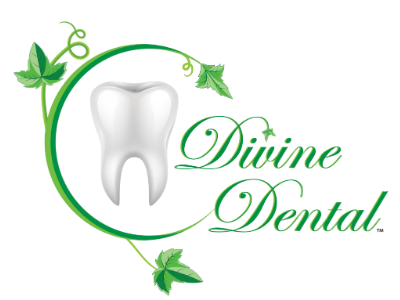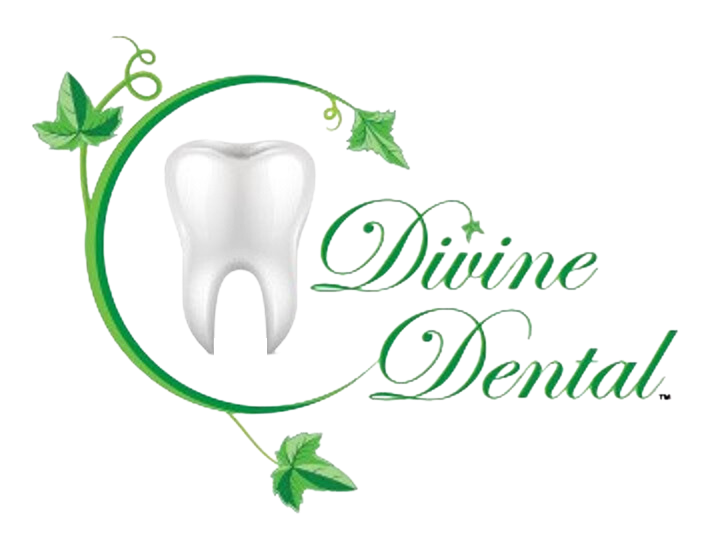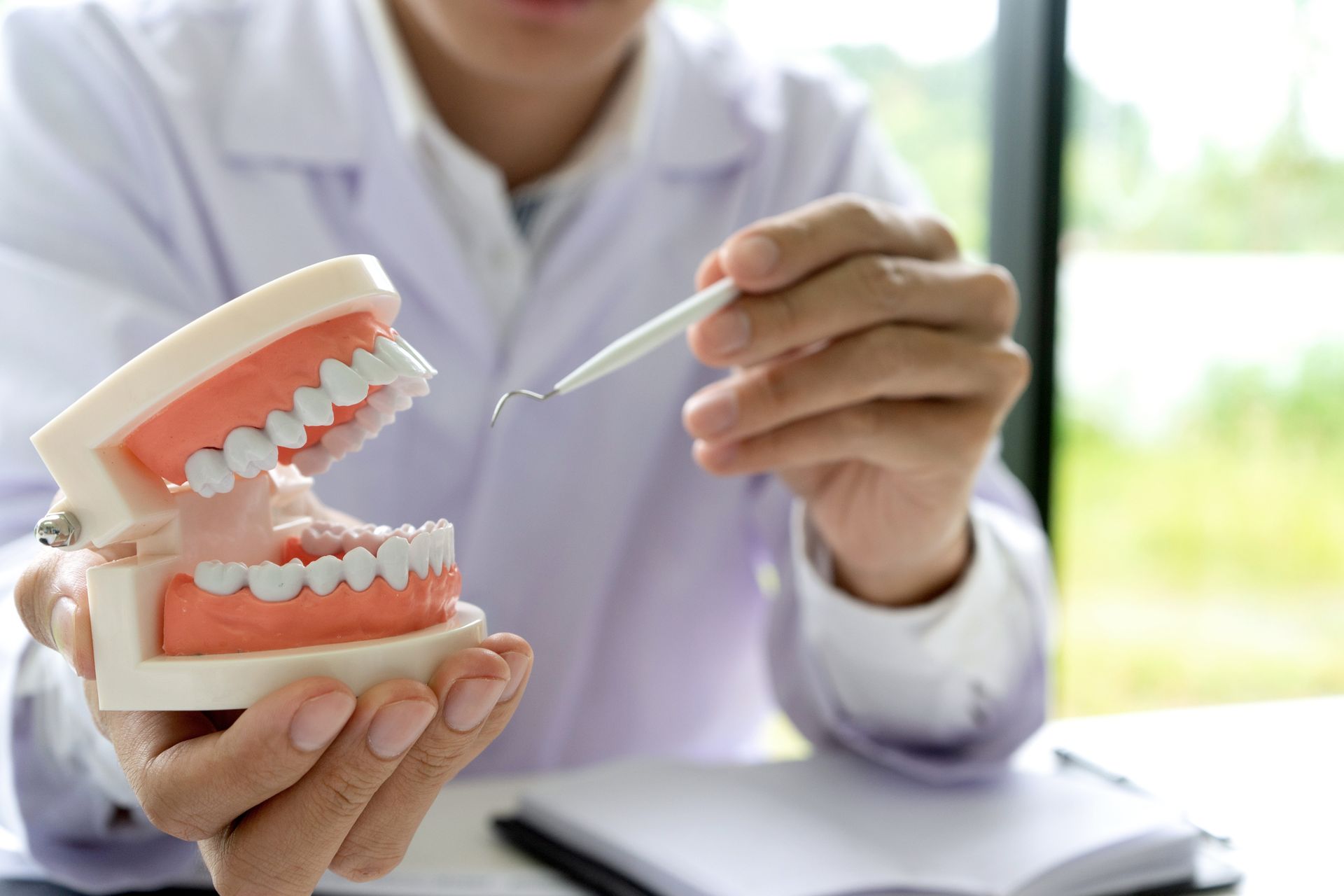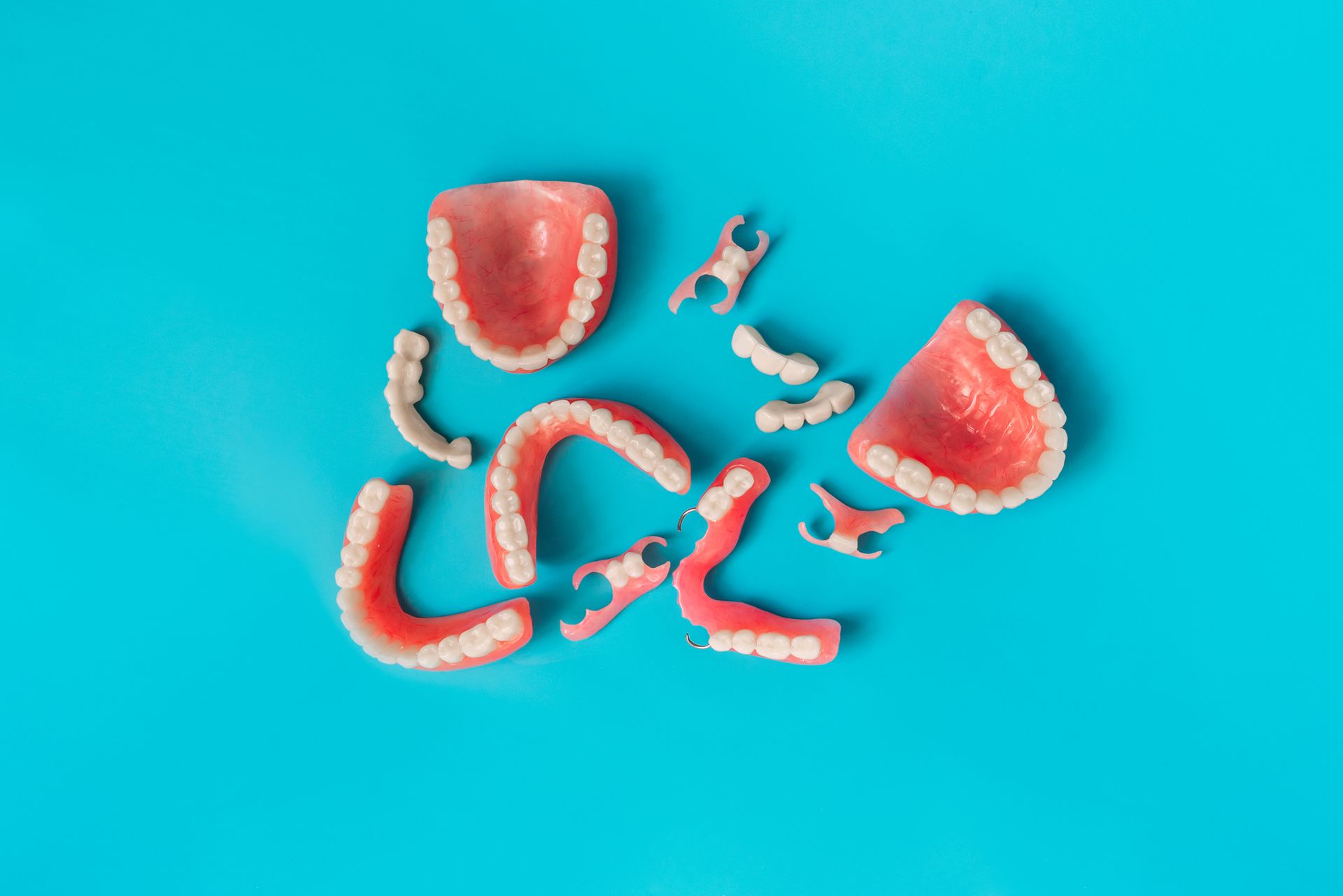Scottsdale Dentures
Our goal is to put a smile on your face, and we'll do everything it takes to ensure we do.
Get A Free Second Opinion
Dentures From Divine Dental
Are you tired of living with missing teeth and feeling self-conscious about your smile? Look no further than Divine Dental in Scottsdale, Arizona, for high-quality dentures that restore your confidence. With years of experience and state-of-the-art technology, their team of skilled dentists will create a customized set of dentures that fit comfortably and look natural. Say goodbye to discomfort and hello to your new smile with Divine Dental. Call them today to schedule your appointment and take the first step towards a happier, healthier you.
At Divine Dental in Scottsdale, AZ, we prioritize comprehensive care and information regarding dentures. Here's what you need to know:
- Additional Services: We offer a range of denture-related services that may incur separate fees, including temporary liners, tissue conditioners, and relines. These services ensure optimal comfort and fit for your dentures.
- Scheduling a Consultation: If you're interested in scheduling a Denture Consultation, please contact us directly.
- Types of Dentures: Divine Dental offers various types of dentures to meet diverse dental needs, including immediate, partial, and implant-retained dentures. Our comprehensive care includes regular exams, adjustments, and maintenance to ensure your dentures fit comfortably and function effectively.
- Post-Extraction Care: After tooth extraction, proper care of your gums and dentures is essential. This involves regular follow-up visits to monitor healing and adjustments to ensure a precise fit. Temporary solutions like liners or tissue conditioners may be used during the healing period.
- Immediate Dentures: Immediate dentures are recommended for individuals facing complete tooth extraction. They provide an immediate solution to maintain a natural-looking smile and aid in the healing process. While adjustments may be necessary, they offer a seamless transition and long-term benefits, especially when combined with dental implants for added stability and comfort.
At Divine Dental, we're committed to providing you with the information and care you need for a confident and comfortable denture experience.
Dentures In Scottsdale, Arizona
At Divine Dental in Scottsdale, Arizona, we understand the importance of having a beautiful, healthy smile. That's why we offer top-of-the-line dentures to our patients who need them. Our team of experienced dentists has the expertise to create customized dentures that fit comfortably and work seamlessly with your existing teeth. Whether you need partial, complete, or implant-supported dentures, we'll work with you to find the perfect solution that restores your smile and confidence. With Divine Dental, you can trust that your dentures will look natural and be comfortable and functional. Say goodbye to missing teeth and hello to a beautiful smile with Divine Dental's denture options.
What Are The Benefits Of Dentures?
Dentures benefit those who have lost some or all of their teeth. Not only do they help to improve the appearance of the mouth by filling out the face, but they can also assist in chewing and speaking correctly. Additionally, dentures help maintain the mouth's shape by supporting the cheeks and lips, which can otherwise sag and cause an older appearance. Not only do they restore confidence and self-esteem, dentures can make eating a broader range of foods more accessible, and they're customizable to ensure complete comfort. Dentures are an excellent option for those looking to improve their oral health and quality of life.
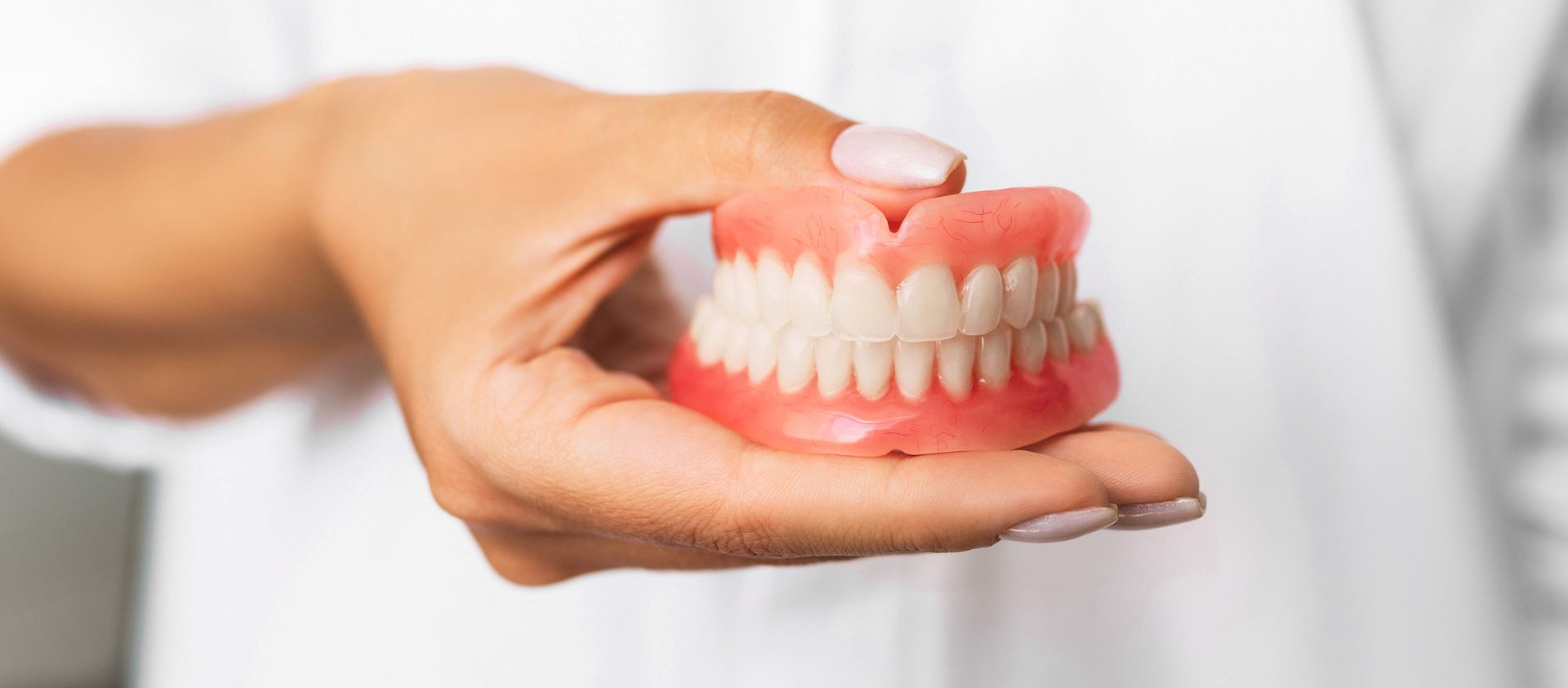
How Do Dentures Work?
As people age, their teeth can become worn, damaged, or fall out entirely. In these situations, dentures offer a solution for restoring the appearance and function of a healthy smile. Dentures are custom-made, removable prosthetic devices replacing missing teeth and adjacent tissues. They work by creating a suction seal between the mouth and the dentures, which helps keep them in place while speaking or eating. Dentures are typically made from acrylic resin or porcelain and are designed to mimic the look of natural teeth. Dental implants may also support Some types of dentures, which provide additional stability and security. Despite the initial adjustment period and necessary care, dentures allow individuals to regain confidence and a natural-looking smile.
Question 1.
What should I do if my dentures are damaged?
If you notice any damage to your dentures such as a crack, chip, or break, it is important to take action promptly. Visiting your dentist is essential in such situations, ideally every six months or sooner. During these check-ups, your dentist will carefully examine the damage and determine whether it can be repaired or if replacement is necessary. It is generally advisable to have your dentures assessed as soon as possible in order to ensure the most convenient and cost-effective treatment options are available to you. Therefore, if you experience any issues with your dentures, scheduling an appointment with your dentist is the recommended course of action.
Question 2.
Will I be put to sleep for the dentures procedure?
When it comes to the dentures procedure, it is generally less invasive, and as a result, anesthesia is not typically required. However, it is important to note that if you require additional procedures like teeth extraction or implants in conjunction with getting dentures, you may choose to have anesthesia administered for those specific procedures.
Question 3.
How often do I need to replace my dentures?
To ensure a proper fit and function, dentures should be adjusted several times when you first receive them. However, it is important to note that even a slight change in your jaw shape or alignment may necessitate the need for new dentures. In addition to these adjustments, regular dental visits every six months are crucial for the examination and professional cleaning of your dentures or partials. Your dentist will carefully assess your mouth, teeth, and gums, checking for proper fit, function, and any signs of infection or oral diseases. Furthermore, maintaining good oral hygiene may require two to four dental hygiene visits a year, which include cleaning your natural teeth as well as your dentures or partials. By following these guidelines and consulting with your dentist, you can determine the appropriate frequency for replacing your dentures.
Question 4.
What are the alternatives for dentures?
There are several alternatives to dentures for replacing missing teeth, including dental implants and dental bridges. Both dental implants and bridges are popular options for replacing one, a few, or even all missing teeth. Unlike dentures, these alternatives provide a more permanent solution as they are fixed in the mouth and not removable.
Dental implants are artificial tooth roots that are surgically placed into the jawbone. They provide a stable foundation for a replacement tooth or crown, offering a natural look and feel. Implants can be used to replace a single tooth or multiple teeth, and they can last a lifetime with proper care.
On the other hand, dental bridges are another option to consider. A bridge consists of one or more artificial teeth that are anchored to the adjacent natural teeth or dental implants. This creates a fixed restoration that fills the gap left by missing teeth. Bridges also provide a natural appearance and can significantly improve chewing and speaking capabilities.
Both dental implants and bridges offer advantages over dentures. They feel more like natural teeth and are more secure since they are not removable. Additionally, these alternatives can improve the overall aesthetic appearance of the mouth. However, it's important to note that they may involve slightly higher costs and more non-invasive procedures compared to dentures.
While dentures are a more cost-effective option, dental implants and bridges are often chosen for their superior outcomes and more desirable long-term results. By considering these alternatives, individuals have the opportunity to achieve a permanent solution that closely mimics the look and function of natural teeth.
Question 5.
How much do dentures cost?
The cost of dentures can vary and depend on a variety of factors. Some important considerations that can influence the pricing include:
1. Type of Dentures: Whether you opt for full dentures to replace all of your missing teeth or partial dentures to replace only a few missing teeth will affect the cost.
2. Tooth Extraction: If any tooth extraction is necessary prior to the placement of dentures, this additional procedure may incur additional costs.
3. Existing Natural Teeth: If you have any remaining natural teeth that require treatment, such as fillings or crowns, this may also impact the overall cost of dentures.
4. Gum Work: In some cases, extra work on the gums may be necessary. This can include routine cleaning or a more extensive procedure known as "deep cleaning." These additional gum treatments can affect the final cost.
5. Dental Implants: If you choose to have dental implants placed to improve the retention and function of your dentures, this can significantly increase the overall cost.
6. Dental Insurance: Having dental insurance coverage can have a significant impact on the cost of dentures. However, it is important to understand your insurance plan's specific guidelines for coverage. Some plans may cover certain procedures, such as implant placement, while others may have limitations or exclusions.
To provide an accurate cost estimate for dentures, it is recommended to have an examination with X-rays. Once the dentist has evaluated your specific needs and desired outcome, the front office team can provide a detailed treatment plan with an accurate cost if you do not have dental insurance coverage. If you do have dental insurance, they can provide you with a good estimate of the expected costs, taking your insurance coverage into account. It is important to note that dental insurance plans can vary, and it's essential to understand the details of your coverage.
Question 6.
What is the denture process at Smile Arizona Dentistry?
At Smile Arizona Dentistry, the denture process typically involves several steps and requires multiple visits to ensure the best fit and comfort for our patients. Here is an overview of what you can expect during the denture process:
1. Initial Evaluation and Examination: During your first visit, our dental team will assess your specific needs for tooth replacement. We will conduct a thorough dental examination to check the health of your soft tissues and gums. X-rays may be taken to examine the condition of your underlying jawbones. This evaluation helps us determine if any additional procedures, such as tooth extraction, bone reshaping, or removal of excess tissue, are necessary to ensure optimal denture fit.
2. Preparing Your Mouth for Dentures: If any extractions or other preparatory procedures are required, they will be performed during subsequent visits. We want to ensure that your mouth is healed and ready for dentures before moving forward.
3. Taking Impressions and Creating Dentures: Once your mouth is ready, we will take impressions of your gums, remaining teeth (if any), and jaw alignment. These impressions will be sent to a dental lab where your custom dentures will be crafted to fit your mouth precisely.
4. Placing Temporary Dentures: Sometimes, immediate dentures will be placed right after any necessary extractions. These temporary dentures allow you to have functioning teeth while your final dentures are being made. This also helps with the healing process.
5. Fitting and Adjusting: Once your final dentures are ready, we will schedule an appointment to place them in your mouth. During this visit, we will ensure that they fit properly and make any necessary adjustments to ensure proper alignment and comfort. It is common for dentures to require minor modifications to achieve the desired level of comfort and avoid mouth irritations.
6. Follow-Up and Adaptation: Adjusting to dentures takes time, and every patient is different. We will schedule follow-up appointments to monitor your progress and make any necessary further adjustments. It is important to be patient and kind to yourself during this healing process. With time and proper adaptation, dentures will feel normal and provide you with a confident smile.
Our goal at Smile Arizona Dentistry is to provide you with dentures that fit comfortably and function effectively. We strive to ensure your satisfaction throughout the denture process and beyond.
Question 7.
What types of dentures are provided at Smile Arizona Dentistry?
At Smile Arizona Dentistry, we offer a range of denture solutions to meet your specific needs. Our Scottsdale-based dental care facility provides the following types of dentures:
1. Removable Partial Dentures (RPDs): RPDs consist of gum-colored bases that hold replacement teeth and attach to the neighboring natural teeth using precision attachments, which are metal frameworks. These dentures are perfect for individuals who are missing one or more teeth in either the upper or lower jaw. RPDs are slim yet durable, and they conduct heat and cold, providing a natural feel in the mouth. For those who prefer to have no visible metal, we also offer metal-free options.
2. Implant Retained Dentures (IRD): IRD is a highly functional and effective solution for tooth replacement. In this procedure, the denture is attached to small titanium dental implants or posts. Sufficient jawbone height is necessary to support the implants. IRDs are recommended for individuals seeking improved denture stability and bite function.
3. Removable Full Dentures (RFDs): A full upper denture is secured in place by creating a seal with suction on the bone ridges, palate (roof of the mouth), and gums. Lower dentures, on the other hand, face more stability challenges. To address this, patients often choose to include two or more anchors, known as dental implants, in their lower denture treatment plan. These anchors help the lower denture snap into place, offering enhanced stability and functionality.
Question 1.
How do I take care of my dentures?
Sub-Questions
What should be done before wearing dentures?
Before wearing dentures, it is crucial to rinse them thoroughly to ensure they are clean. This helps eliminate any residual cleaning agents and maintains oral hygiene.
Should dentures be worn during sleep?
It is advised to remove dentures at night and not wear them during sleep. After cleansing, dentures should be stored in plain water to keep them moist and protect them from minor warping.
How should the mouth, tongue, and gums be cleaned without dentures?
Even without dentures, it is essential to clean the mouth, tongue, and gums. This should be done at least once daily. Using a soft-bristled toothbrush or a tongue cleaner, gently clean these areas to maintain oral hygiene.
How should dentures be rinsed after eating?
After eating, dentures should be rinsed along with the mouth to eliminate any food particles. It is recommended to remove the dentures for thorough rinsing, ensuring all debris is removed.
How should dentures be brushed?
Dentures should be brushed inside and out daily using a soft-bristled denture toothbrush. These specialized brushes are designed to reach difficult-to-reach areas of dentures.
Question 2.
What are the advantages of dentures?
Sub-Questions
Can dentures restore confidence?
Yes, dentures can restore confidence by providing a beautiful and healthy smile. The loss of teeth can have a significant impact on self-esteem, but dentures can help individuals regain their confidence by giving them a complete and attractive smile.
What is the impact of dentures on facial muscles?
Dentures can prevent sagging of facial muscles caused by the loss of teeth. By filling out the face and restoring the natural shape, dentures help support the facial muscles, providing a more youthful and lifted appearance.
How are dentures customized to match natural teeth?
Dentures are customized to match the color, size, and shape of natural teeth, resulting in a natural-looking appearance. Dentists work with patients to create dentures that blend seamlessly with their remaining teeth, ensuring that the dentures look as close to natural teeth as possible.
How do dentures function in terms of eating and speaking?
Dentures are designed to function as close to natural teeth as possible, allowing individuals to eat and speak clearly. They provide a replacement for missing teeth, enabling proper chewing and biting of food, and also help in articulating sounds for clear speech.
How do dentures impact facial appearance and muscles?
Dentures can improve facial appearance by filling out the face and preventing sagging of facial muscles. Loss of teeth can cause the facial muscles to sag, but dentures help restore the natural shape of the face, making it appear more youthful and preventing the sagging effect.
Contact Divine Dental Today For A Consultation!
Are your dentures causing you discomfort? Contact Divine Dental today and schedule a consultation. With years of experience, our team of experts will examine your teeth and determine the best possible solution for your individual needs. We understand that wearing dentures can be daunting, and we are here to provide you with a comfortable and effective solution. Our state-of-the-art technology and commitment to patient care ensure that you will leave our office with a smile on your face. Don't let uncomfortable dentures hold you back any longer – contact Divine Dental and take the first step towards a healthier, happier mouth today.
Can implants help maintain bone level and prevent future bone loss?
Dentures offer individuals the chance to regain their confidence and enjoy a natural-looking smile. They require an initial adjustment period and diligent care to ensure proper functioning. However, it is important to note that dental implants can provide additional support for certain types of dentures, offering enhanced stability and security.
Moreover, it is worth mentioning that implants play a crucial role in maintaining bone level and preventing future bone loss. By utilizing implant-supported dentures, individuals can experience a strong hold that eliminates any discomfort or embarrassment caused by loose dentures in public settings. Not only do implants provide stability, but they also contribute to the preservation of bone density, ensuring that future bone loss is minimized or even prevented.
Therefore, while dentures alone can restore confidence and a natural-looking smile, it is important to consider the added benefits of dental implants. They not only provide a secure fit for dentures but also safeguard against bone loss, promoting long-term oral health and well-being.
Question 1.
What are cosmetic dentures and how do they differ from standard dentures in terms of appearance and comfort?
Cosmetic dentures are specifically designed to closely resemble natural teeth in appearance. Unlike standard dentures that may become ill-fitting over time due to the heat curing process used in their production, cosmetic dentures are made from a special acrylic base that prevents shrinkage and warping. Additionally, some cosmetic dentures utilize dental implants to enhance their appearance and function. These implants are placed within the mouth to provide a secure anchor for the dentures, preventing movement and ensuring greater comfort compared to traditional dentures. Overall, cosmetic dentures offer a more natural appearance and improved stability for the wearer, enhancing both aesthetics and functionality.
Question 2.
How do standard full dentures differ from partial dentures?
Standard full dentures differ from partial dentures in several key aspects. Full dentures consist of a complete set of upper and lower teeth, utilizing suction for stability. These dentures are made of pliable material, making suction easier but also requiring regular dental visits to address potential shrinkage issues that can lead to an ill-fitting prosthesis and jawbone atrophy. Conversely, partial dentures replace only a limited number of teeth and rely on support from the remaining teeth and gums for stability. Partial dentures are typically a single piece fitting that offers greater security and comfort compared to standard full dentures.
Question 3.
What are the different types of dentures available for people who have lost their teeth?
There are several types of dentures available for individuals who have lost their teeth, each offering unique benefits and features:
1. Removable Dentures: This type of denture is versatile and cost-effective, making it a popular choice for many. Removable dentures can be easily taken out for cleaning and maintenance.
2. Standard Full Dentures: These dentures consist of a complete set of upper and lower teeth and rely on suction to remain in place. However, they may require regular adjustments as the pliable material used in their construction can shrink, leading to discomfort and potential jawbone atrophy.
3. Partial Dentures: Partial dentures are designed to replace only a few missing teeth, providing a more secure and comfortable fit by relying on the support of remaining teeth and gums.
4. Cosmetic Dentures: Cosmetic dentures are tailored to look as natural as possible, often using special acrylic bases to prevent shrinkage and warping over time. Some cosmetic dentures may also incorporate dental implants for added stability, ensuring a secure fit without any movement, enhancing overall comfort.
